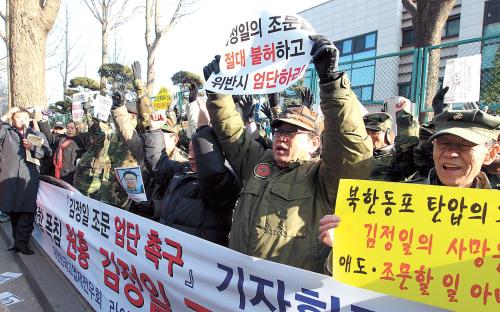Unification minister says Seoul will make ‘careful decision’
Whether South Korea should express its condolences to North Korea over the death of its leader Kim Jong-il and send a delegation to his funeral has emerged as a hot-button issue with people sharply divided along ideological lines.
The government, which has taken a conservative policy toward the North, is apparently agonizing over how to best handle it while minimizing political ramifications ahead of major elections next year.
Observers are concerned that a failure to cope with the issue could spawn another ideological dispute here, which was seen in 1994 when Kim’s father and national founder Kim Il-sung died of cardiac arrest.
Seoul’s Unification Minister Yu Woo-ik said that the government will take all factors into account and “carefully” make a decision over the issue.
“We will carefully reach a decision after comprehensively reviewing the past, present and future of the inter-Korean relations and the public sentiment,” he said during a session of the National Assembly’s committee on unification and foreign affairs.
“North Korea is in fact a threat to our security, and at the same time, a partner for dialogue. Under this situation, our government’s decision will affect not only inter-Korean ties, but also situations in the entire East Asia. This calls for our comprehensive and careful consideration.”
 |
Members of local conservative groups stage a protest to call on the Seoul government not to send its delegation to the funeral of North Korean leader Kim Jong-il, slated for Dec. 28, in front of the central government building in Seoul on Tuesday. (Yonhap News) |
Liberal political forces including the main opposition Democratic Unified Party say that Seoul should send a delegation, stressing that this could be a rare chance to improve bilateral ties.
Some pointed out that as the North sent delegations to the funerals of former Presidents Kim Dae-jung and Roh Moo-hyun, the South should organize and dispatch a government-led team to the funeral slated for Dec. 28.
Several leading civic groups including the Citizens’ Coalition for Economic Justice called for the delegation.
“The Seoul government should ensure that unnecessary tensions and conflicts are sparked on the peninsula. In light of our efforts to seek a new chance to entrench peace on the peninsula, we call on it to make a courageous decision to send its team,” CCEJ said in a statement.
But conservatives argue that the delegation would divide public opinion at a time when citizens should stand united to cope with Kim’s death, and that pro-North Korea forces in the South would utilize the event to cause confusion here.
“Historically, Kim Jong-il is guilty of national treason and terrorism. If we express our sympathy toward his death, it is like we cannot distinguish what is right or wrong and who is friendly or hostile. When Hitler died, did the Jews went to his funeral?” said Cho Gab-je, former chief editor of the Monthly Chosun.
“President Lee Myung-bak should offer his strict evaluation of the history and the government position on the new peninsular situations that could change after Kim’s death, rather than expressing sympathy to the deceased.”
After Kim Il-sung died in 1994, the government prohibited the dispatch of civilian delegations and banned alters for the mourning of his death. The North angrily responded to it, saying it would not talk or cooperate with the South over any issues.
Hong Hyun-ik, North Korea expert at Sejong Institute, however, said that it would be good for Seoul to express condolences to the North, but bad for it to send a government-led delegation.
“By expressing our sympathy, we can have more leeway in our management of the North Korean situations. I think in some sense, Seoul needs to be more active with this issue so that it can grab the upper hand on the peninsular situations and help move forward to the future,” he said.
“But it’d better not send the delegation as it could amplify the ‘South-South” conflict among its people. What is better is that it can allow a team comprising symbolic figures such as widows of the former presidents who received delegations from the North to go to the North.”
The ruling Grand National Party appears circumspect over the issue as an ideological conflict is simmering among the people.
“As we are a ruling party, we should be careful about it while taking into account public opinions,” GNP floor leader Hwang Woo-yea told reporters.
The GNP was split on the issue. Reps. Won Hee-ryong, Kwon Young-se and other lawmakers supported the dispatch of the delegation to the North.
But Rep. Park Geun-hye currently leading the GNP emergency committee expressed concerns, saying that it is not the time to discuss it when memories of the two deadly attacks last year are still potent in the minds of citizens.
By Song Sang-ho (
sshluck@heraldcorp.com)








